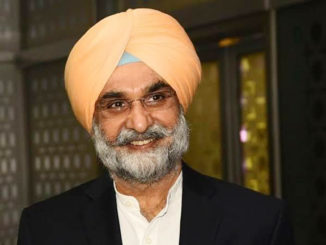
The president’s announcement of the fate of the iconic Pennsylvania-based company, which became a contentious political issue in an election year, is expected as soon as Friday.
WASHINGTON, D.C. (TIP): President Biden has decided to block the $14 billion takeover of U.S. Steel by Nippon Steel of Japan in an announcement expected as soon as Friday based on grounds that the sale poses a threat to national security, according to people familiar with the matter, a New York Times report says.
The decision would be an extraordinary use of executive power, particularly for a president who is just weeks from leaving office. It is also a departure from America’s long-established culture of open investment, one that could have wide-ranging implications for the U.S. economy.
Mr. Biden’s move to stop the transaction could cause foreign investors to rethink the wisdom of acquiring American firms in sensitive industries that are based in politically important states. It could also roil relations with Japan, a close ally of the United States and one of America’s largest sources of foreign investment.
The president’s decision to block the deal came after a federal committee reviewing the transaction opted to not make a formal recommendation about whether the takeover should be allowed to proceed, according to letters sent to the companies and the White House last month.
The Committee of Foreign Investment in the United States, which is made up of agencies including the departments of Treasury and Justice, expressed reservations about the deal to the companies in a letter last month. CFIUS (pronounced SIFF-ee-yuhs) voiced concerns that the transaction could pose a national security threat to the United States by potentially leading to a decline in American steel production. The officials suggested that Nippon’s other global business considerations could in the future outweigh its pledges to invest in U.S. Steel.
The lack of a formal recommendation cleared the way for Mr. Biden, barring an unexpected change of heart, to end a transaction that became ensnared in election-year politics. But that decision could face challenges in court. Nippon had indicated that it was prepared to take legal action if the deal was blocked.
Nippon sent a letter to CFIUS last month that accused the White House of “impermissible influence” in the process. Nippon said the concerns raised by CFIUS were “littered with factual inaccuracies and omissions, misleading and incomplete statements, conjecture and hypotheticals that have no basis in fact and are plainly illogical.”
U.S. Steel has also continued to push for the deal. After CFIUS failed to make a formal recommendation, the company issued a statement saying that the deal “is the best way, by far, to ensure that U.S. Steel, including its employees, communities and customers, will thrive well into the future.”
CBS News reported earlier that a decision could come as early as Friday.
The politics of Mr. Biden’s decision were clear: U.S. Steel is based in the crucial swing state of Pennsylvania, and its powerful union vehemently opposed the proposed takeover, in part over concerns that Nippon would not honor its commitments to invest in plants and preserve the pensions of workers. The public debate over the acquisition emerged as a key issue ahead of the 2024 presidential election, and Mr. Biden, Vice President Kamala Harris and President-elect Donald J. Trump all publicly said that U.S. Steel should remain American-owned.
Before the election, the Biden administration granted the companies an additional three months to try to address concerns about the deal. By December, however, it was clear that the deal was most likely doomed when CFIUS told Nippon that federal agencies were divided over whether it should proceed, and after Mr. Trump declared that he would block it upon taking office.
“As President, I will block this deal from happening,” Mr. Trump said on social media. “Buyer Beware!!!”
Despite his opposition to the steel deal, Mr. Trump last month welcomed a $100 billion investment in the United States pledged by SoftBank, a Japanese technology company, that will focus on technology and artificial intelligence over the next four years.
The bid by Nippon faced political opposition from the moment it was announced in December 2023. Democratic senators including Sherrod Brown of Ohio and Bob Casey of Pennsylvania, along with Senator JD Vance, the Ohio Republican who is now the vice president-elect, urged Mr. Biden to review the proposed sale to guard against lost steel production and jobs. Both Mr. Brown and Mr. Casey lost their seats to Republican challengers in November.
Shortly before last Christmas, the Biden administration appeared to bend to the concerns being voiced by lawmakers, with Lael Brainard, the director of the National Economic Council, issuing a statement saying that the transaction “appears to deserve serious scrutiny in terms of its potential impact on national security and supply chain reliability.”
While U.S. Steel shareholders approved the deal in April, the likelihood that it would happen dimmed as the presidential election grew closer.
U.S. Steel, which was founded in 1901, has for years faced financial struggles amid the changing dynamics of global metal markets and rapidly evolving technology, which the company was often slow to adopt. The company, whose metal has been used to build some of the nation’s most famous bridges and buildings — such as the Willis Tower in Chicago and the United Nations building in New York — employed 340,000 workers at its peak in the 1940s but now has around 20,000 workers overall, with about 4,000 in Pennsylvania.
A post-pandemic boost to the steel market, which stemmed from a combination of shortages and demand spurred by federal infrastructure investments, had been showing signs of cooling amid worries of a global economic slowdown. In 2023, a U.S. Steel rival, the Ohio-based Cleveland-Cliffs, made an unsolicited offer to buy its competitor. That set off a bidding war that Nippon won.
(Source: New York Times)





Be the first to comment